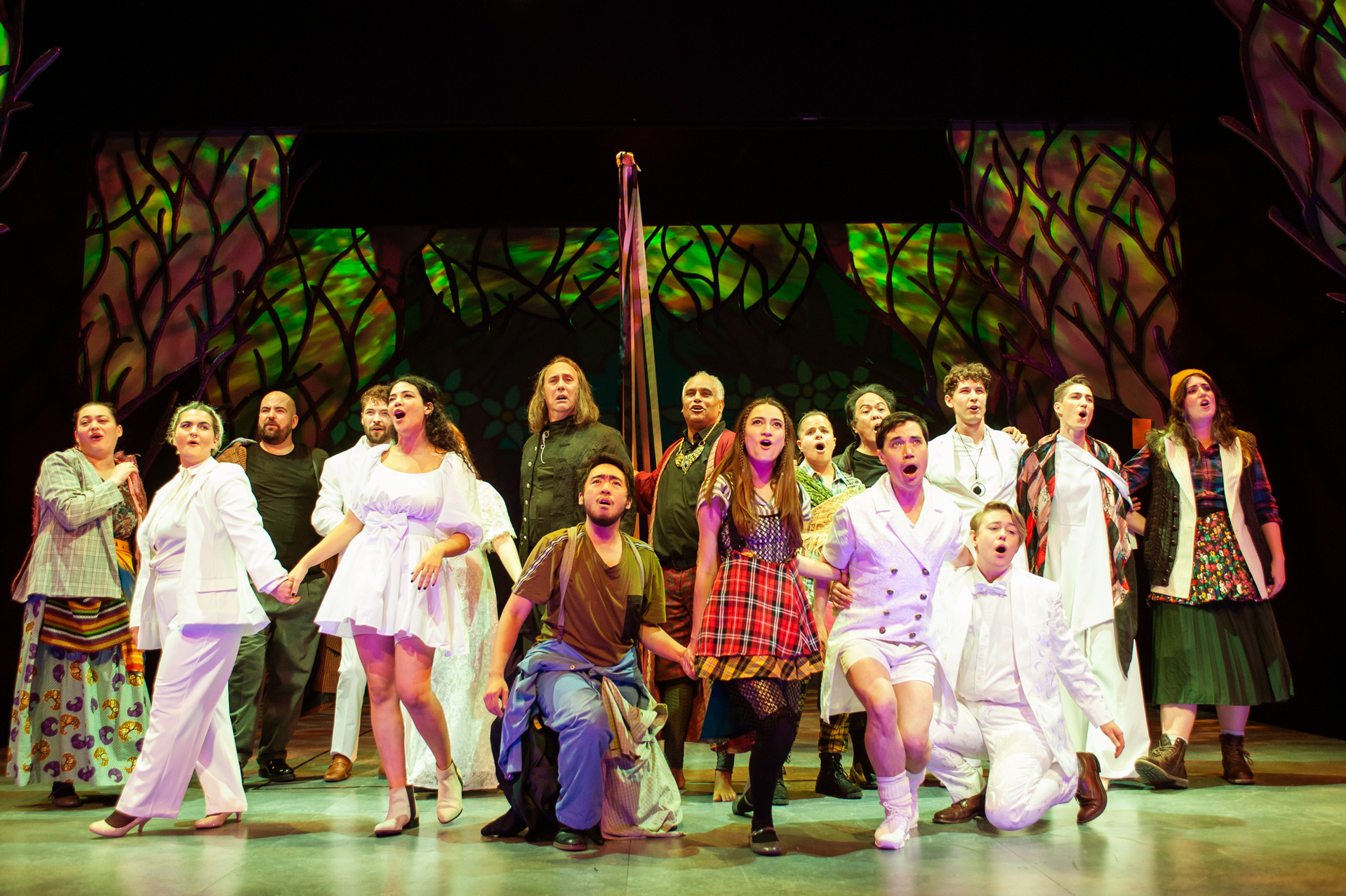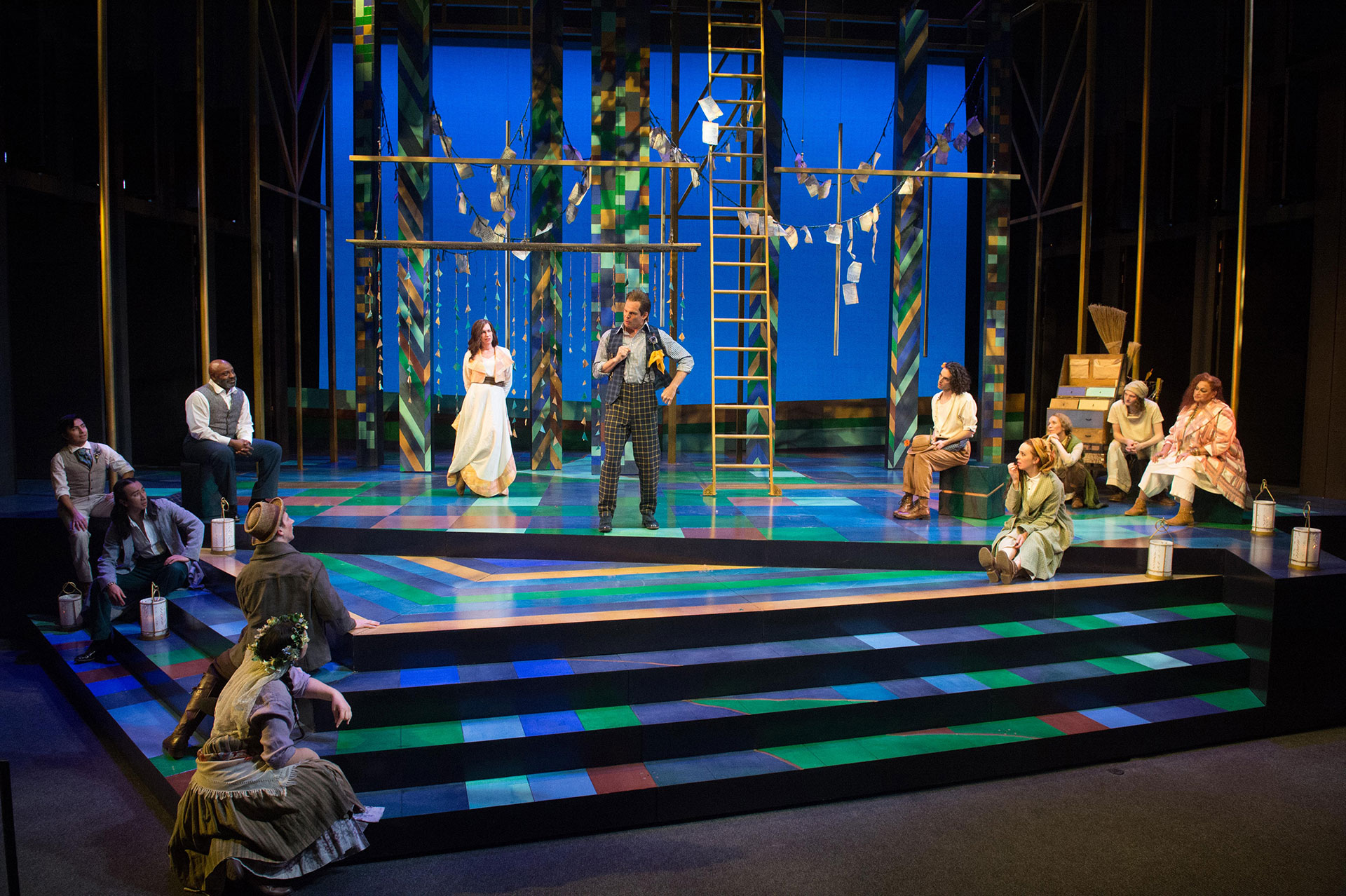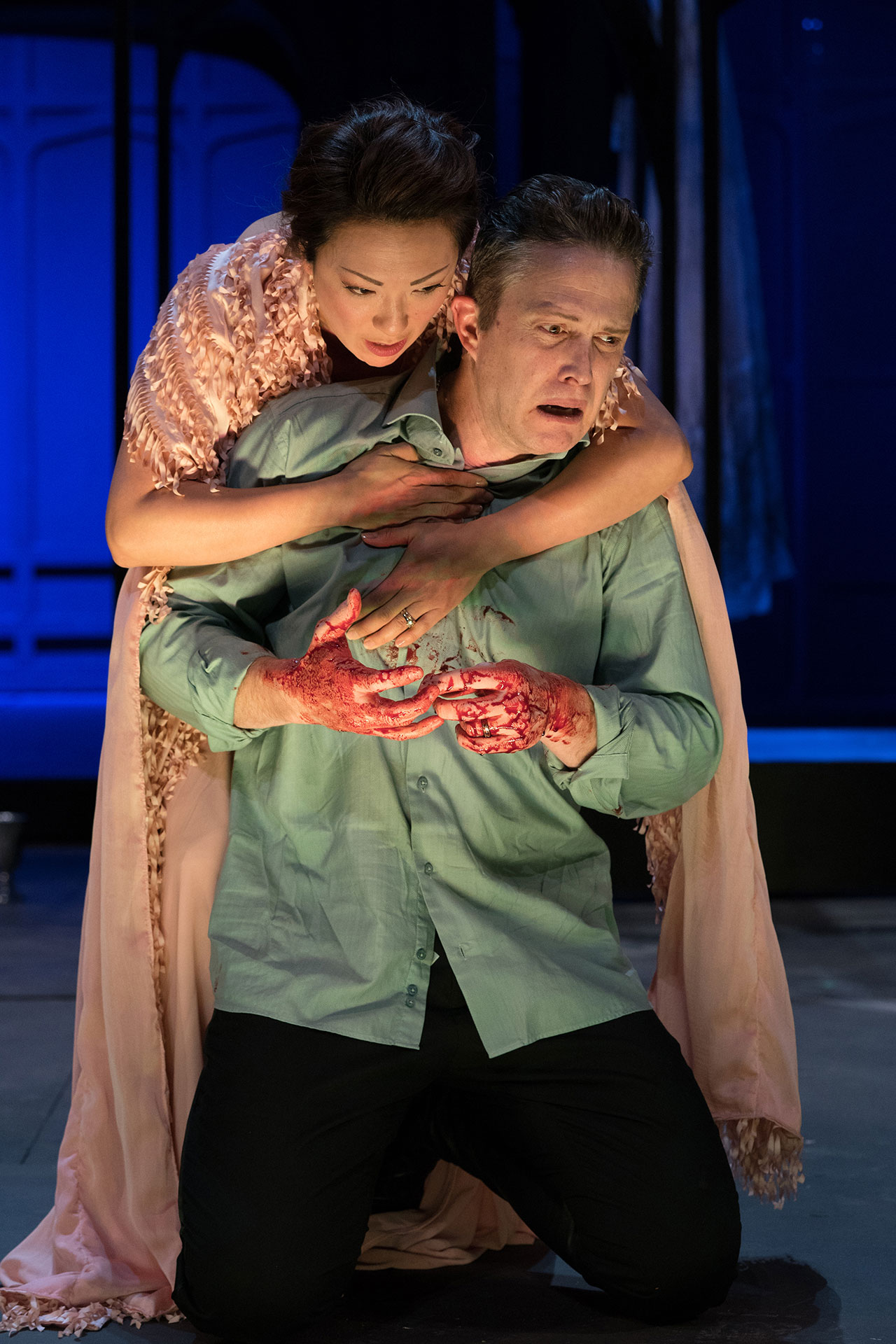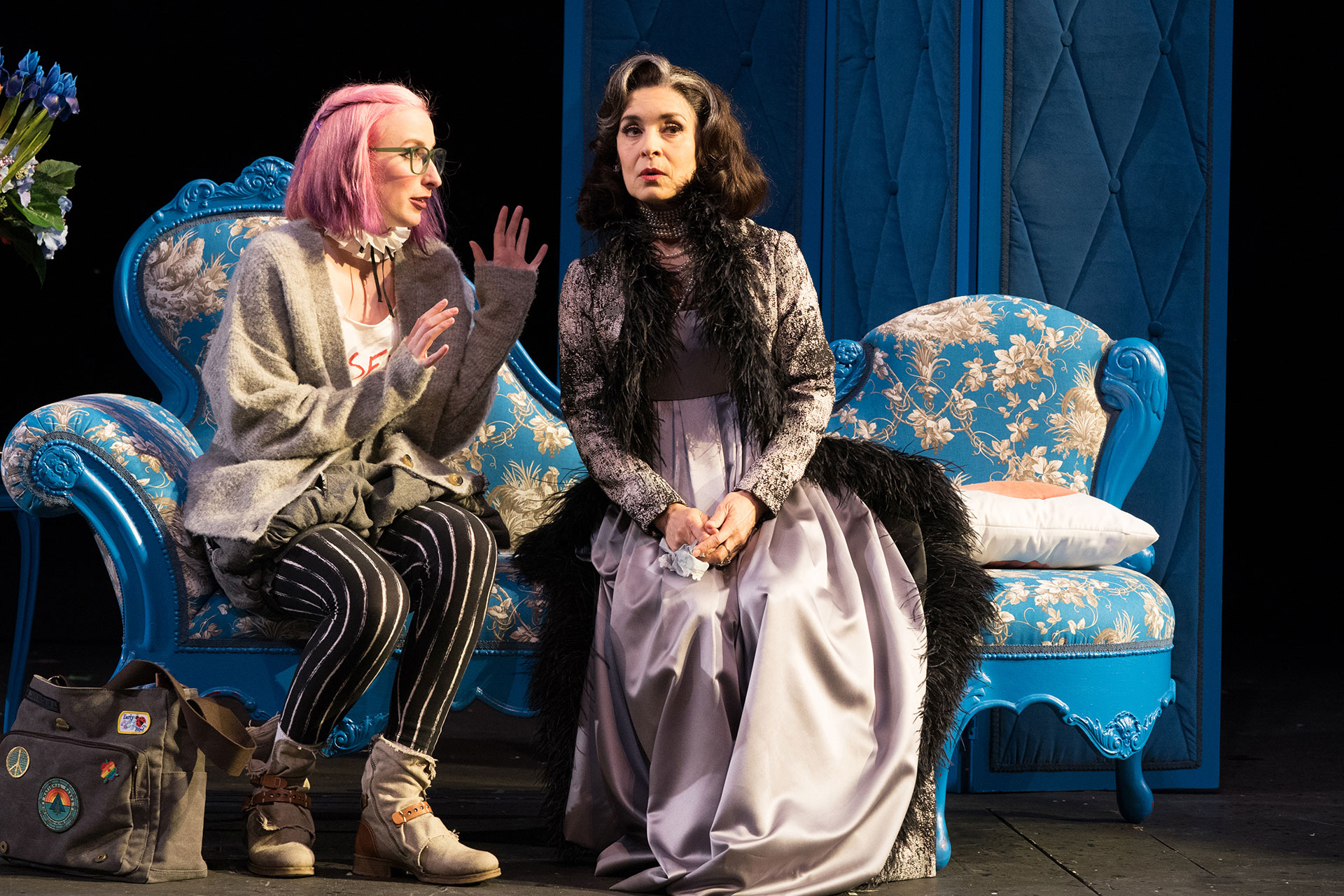 |
| Festival Theatre and swan. Stratford Festival photo by Krista Dodson |
This will be a somewhat different sort of post, partly because I'm so backed up, and partly because I don't really feel it's worth writing 5-or-more posts on this festival visit. So...consider this an experiment (much like this trip was!).
What am I doing in Canada?
I've been hearing for years about this
Stratford Festival, usually in the context that it's sort of Canada's version of the Oregon Shakespeare Festival we've been attending for the last decade or so. Stratford is a bit less convenient to this Bay Area resident than Ashland, but when the opportunity presented itself, we decided to go.
Specifically, we won an auction at a local theater fundraiser that gave us airfare and lodging and maybe two tickets to a show. Clearly we were not going all the way to Ontario just to see one show, so we planned out a long weekend trip. Last year. Personal circumstances kept us from going last year, but we were able to reschedule for this year's Labor Day weekend, so here we are in Stratford!
Stratford is a lovely little down in Southern Ontario, population something like 32,000. It seems like the main industry is this festival, though there are some others. Mostly it has struck us as a quiet little rural town, quite pleasant and walkable (which is good, because parking is difficult). We have basically parked the rental car we drove down from Toronto at our lodgings and not used it since. Lots of walking! Very pleasant.
We scheduled five plays over three days, with a travel day on either end. We wouldn't have minded adding a sixth play, but the schedule didn't permit it. We had already seen the show(s) on offer tonight, and we didn't want to see the other options we could have swapped for.
Much like the Ashland festival, Stratford's is a large, rotating repertory company spread across three theaters in town. (A fourth is undergoing major renovations/replacement and will reopen in 2020.) Each venue basically has a matinee and an evening show every day, with Mondays dark. All three theaters are indoors.
The main theater, the Festival Theatre, is the heart of the festival complex, housing both the 1800+-seat room with a 3/4 thrust stage and the rehearsal spaces, administrative and creative spaces. The 550-seat Avon Theatre is a converted vaudeville house with a standard proscenium stage. Adjacent to it is the Studio Theatre, a roughly 250-seat black box that is at least currently set up in 3/4 thrust.
It's about a 20-minute walk from the Festival Theatre to the downtown area where the Avon and Studio theaters are. If you want a more leisurely stroll, you can walk along the river and see ducks, geese, and swans in abundance. It's quite a lovely feature of the town.
OK, enough of that...let's talk about plays.
Bronté: The World Without
Small play, small theater, and a commissioned premiere at that. This one is in the Studio, and it has only three actors, portraying the Bronté sisters, Charlotte, Emily, and Anne. It's basically a historical piece about these three sisters growing up in poverty, largely confined to the parsonage where they live with their aging father and dissolute brother. For a literary group, they seem remarkably poor at communicating among themselves. They seem mostly to live by insulting one another, and barely seem to even realize they are all writing poetry and novels. Eventually they have to decide whether to publish their work, and that puts additional strains on the relationship.
Overall, it's pretty interesting and quite well acted. Jessica B. Hill as Emily was truly outstanding, and Andrea Rankin as the youngest and least-known sister Anne really blossoms as the play progresses. Beryl Bain plays Charlotte as something of a cipher, so stoic that it's really hard to understand her character's motivations and development.
I found the play itself somewhat lacking in an overall message, but it was a well-done portrait of three characters I knew little about. I would have appreciated a bit more background on how they got to the point they started from. The sibling rivalries are evident, but unexplained, so I'm left to speculate, which seems a bit unsatisfying.
It was a pretty easy introduction to the festival, however.
Paradise Lost
Yet another commissioned work and world premiere--not bad for our first day in town! This one, as the name implies, is based on John Milton's epic poem of the same name, but it's a new play written by local (Hamilton, Ontario native) playwright Erin Shields. It also tells the tale of humanity's fall from grace (including the retelling of the revolt of Lucifer/Satan and the angels), but from a rather different, more modern perspective. The first and most obvious change is that Satan is female (played by 30-year Stratford veteran Lucy Peacock, who is terrific in this role). That changes a lot of the dynamics, and many of the other angels are also played by women.
I thought the best bits in the play came early, as the newly-fallen angels debate how to deal with the fact that they are now in Hell, but the later scenes leading to Adam and Eve (and a clever handling of the serpent) were good, too.
I came in expecting something a bit more staid and Miltonian, but I was pleased with the creative effort in this new show.
Coriolanus
I'm getting really close to fulfilling my goal of seeing the entire Shakespeare canon performed, and one of the plays I hadn't ever seen was this one, about an ambitious and arrogant Roman soldier who moves into politics but has a huge falling out that leads him to join with his rival to come back and fight against Rome.
André Sills as the title character is quite brilliant, as is Lucy Peacock (again!) as his mother, Volumnia. And the conception of the production, from Director and Set Designer Robert Lepage, is clever, maybe even brilliant. The execution of that design seems a bit self-absorbed; particularly early on, there are transitions that are just too long and slow. But the overall presentation, very cinematic and paced more like a TV drama than a Shakespearean play, does highlight the interactions of celebrity, media, ego, family, class, and connections that all combine to bring down Coriolanus.
But there are other elements that I just couldn't quite fathom. The dress and setting is contemporary, but the projected sets are (largely) Roman period, so there is a lot of dissonance that I can't quite reconcile. And underlying everything is probably the fundamental reason this play isn't produced very often: the main character is just really problematic. It's really hard to understand how he ends up in the situation he does, how the combination of his ego and his boosters' interests culminate in a thoroughly unstable position. But the bits around it are all really good, so I guess that's forgivable.
One special treat for us was seeing Stephen Ouimette as Junius Brutus, one of the tribunes. Having just rewatched "Slings and Arrows" shortly before our trip, it was really fun to see him on stage.
On the down side, the access in the lovely Avon Theatre is terrible. We were seated rather near the front, and it took nearly the entire intermission to get out to the lobby. Luckily we were able to obtain drinks we could bring back in, but I shudder to think what would happen if they needed to clear the building quickly.
Overall, an impressive production, and a satisfying way to add another tick to my list of the Shakespeare canon.
A Comedy of Errors
While the rest of the family went off to see
The Rocky Horror Show, I decided to see how the festival would treat one of my favorite comedies.
The answer is: very well. This is a crisp, clear, pretty straightforward rendering of this classic mistaken-identity play. Most of the productions I've seen of this play have tried setting it in a different time period (e.g., prohibition-era Chicago or the Harlem Renaissance), those settings generally add a layer of complexity to this already-complex scenario. I appreciated the way director Keira Loughran mostly just let the words and actions handle the humor.
What they did play with a lot was gender. Right off the bat, the Duke is cross-dressed as a dutchess, and we'll soon see that both sets of identical twins (the Antipholuses and the Dromios) are both male/female pairs. But importantly, none of this is an issue: each of the pairs is as interchangeable as if they were truly identical, and it never causes any issues. The androgynous costumes for both sets works really well, definitely less distracting than the drag characters, but those are peripheral anyway.
With my fourth play, it was the third time in the Studio Theatre, and interestingly, all three of the actors who were in
Bronté were also in both
Paradise Lost and
The Comedy of Errors. So I got to see the repertory company in action, with all three in quite varied roles. The Studio is small (about 250 seats), but the seats are rather steeply raked, so you feel as if you're right on top of the thrust stage.
All in all, I was quite pleased with my choice, though the family loved the production of
Rocky Horror next door.
An Ideal Husband
Last but not least, back into the Avon Theatre for a matinee of Oscar Wilde's
An Ideal Husband. None of us had ever seen the play, but it seemed like it would be fun. We found the first two acts to be a bit tedious, but after the intermission the play picked up nicely and the witty banter and plot twists kept us quite thoroughly engaged. But it definitely felt like the first half could have been either trimmed or somehow paced more quickly.
Other than that, I don't have a lot to say. It was well done, particularly by Brad Hodder as Lord Goring and Zara Jestadt as Mabel, with a comic boost from Joseph Ziegler as the Earl of Caversham, Goring's father. The whole ensemble is quite capable, though, and the sets are well done.
We were glad we persevered and stayed to the end, as the post-intermission acts were quite satisfying. It's not a show I would go all the way to Stratford to see, but being there, it was a perfectly good play to see.
Reflections on the Festival
The first visit to a festival such as this is a bit intimidating. There is a long-time crowd that has a relationship with the town, the theaters, and of course the company. Of note this season was long-time performer Martha James (who we didn't see at all!) starring as Prospero in
The Tempest, where her first appearance at the festival in 1962 was as Miranda in the same play. Through 44 years, 65 plays (30 by Shakespeare), she is obviously an institution and a real draw for the long-time attendees.
We got a definite sense of some of this when we took some of the excellent tours offered at the festival. The backstage tour of the Festival Theatre is quite impressive--the size and scope of that complex is rather daunting. But I think we got the best feel for the festival itself with the tours of the warehouse and (especially) the archives. The festival has retained a vast amount of material over the years: scripts, costumes, props, photos, and video, and it's all available to researchers and theater makers. That's pretty awesome. And it also illustrates the long-standing community that has grown up around the festival.
We had a similar experience a decade or so ago when we first went to Ashland for the Oregon Shakespeare Festival. It was a little like walking into someone else's family reunion. But eventually we settled in and now we feel comfortable there, looking forward to seeing what our favorite artists are doing each year, noticing the changes, etc.
I think it's safe to say we'll be going back to Stratford, though perhaps not as often or as religiously as we do to Ashland. The quality of the plays is comparably high, and the little community is quite nice as well. There is definitely more to see.
In retrospect, it would probably have been nice to see more of their signature productions, the big shows in the Festival Theatre and some of the smaller shows such as
Long Day's Journey into Night with several of their long-time stars. I heard great things about both
The Tempest and
To Kill a Mockingbird, neither of which we had scheduled. Unlike Ashland, it really didn't seem like there was a good way to come in and see everything (or nearly so) in a relatively short period, and that seems unfortunate for a destination theater festival such as this. I know not everyone wants to see two shows a day, every day, but some of us do!
All in all, it was a good trip, and one we'll look forward to making again.



/Videos_and_Photos/Photos/HN8-On-The-Run-Photography_0600.jpg?n=2085)




